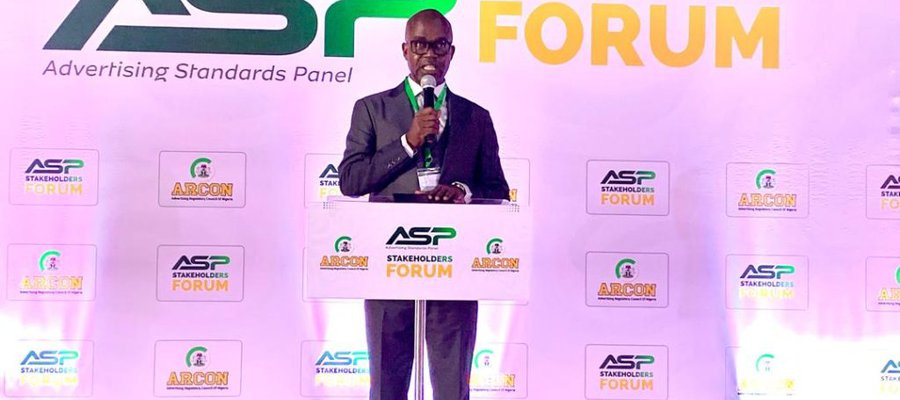
The Advertising Standards Panel (ASP), a statutory body under the Advertising Regulatory Council of Nigeria (ARCON), responsible vetting advertisements and ensuring compliance with existing laws and ethics of the profession, has cleared the air on the modalities and processes in the vetting of advertising, advertisements and marketing communication materials targeted at the Nigerian market and consumers.
The Chairman of the ASP, Dr. Emmanuel Agu, gave the clarification at the ASP Stakeholders’ Forum held on Thursday, June 19, 2025 at Lagos, South West Nigeria.
The event, organized by the Panel in collaboration with ARCON, was a gathering of leaders in the ecosystem, including the immediate past Chairman of ARCON and Group CEO of SO&U, Udeme Ufot, frpa, MFR; Chairman of HASG and President of AAAN, Lanre Adisa, frpa President of EXMAN, Tolu Medebem, and many others.
According to Dr. Agu, in his presentation titled: Advertising Stands Panel and Statutory Responsibilities, the vetting process begins with the submission of ad materials to ASP and payment to ARCON while the ASP evaluates the material for compliance with ARCON Code of Advertising. Thereafter, the Panel examines the content side of the material, cross-checking if the language, images, health claims, etc., comply with the principles enshrined in the Code of Advertising as well as consideration of social, cultural, and religious sensitivity of the society.
The next step, according to the Chairman, is feedback and modification where necessary, and then final approval or rejection with reasons.
He explained that ASP’s scope covers TV, radio, print, digital, labels and packaging, outdoor advertising and influencer marketing, noting that vetting exceptions are applicable to vacancies, notices, financial statements, obituaries and immemorial advertising.
Detailing the specifics, the ASP boss said the areas of focus for vetting include truthfulness and substantiation of claims; avoidance of offensive or discriminatory material; and exaggerations and Superlatives.
The ASP also examines the material for compliance with laws (e.g., health, finance, food, and drug regulations); protection of children and vulnerable groups; and if there is price display - advertisements must display prices in Nigerian currency (Naira).
Among the things looked at is the use of Models. Specifically, models used in advertisements must be Nigerians, except where the concept requires non-Nigerians, in which case a waiver is obtained from the DG of ARCON after due payment is made.
Dr. Agu said the Panel screens the materials for particular violations such as false or misleading claims, offensive or indecent imagery, discrimination or hate speech, unsubstantiated medical or health claims, and unauthorised use of trademarks or personalities.
On its ability to enforce compliance, the “ASP can refuse advertisement/advertising clearance, issue withdrawal notices, recommend legal actions, and recommend unresolved infractions to Advertising Offences Tribunal (AOT),” he revealed.
The ASP has four options to use as penalties for non-compliance. It can request for withdrawal or ban of the advertisement, fine and sanction erring advertisers and agencies, recommend the suspension of license or operating permit and order public retractions and apologies.
The Chairman also spoke on the impact of the Panel on the ecosystem and its role in protecting the consumer and promoting fair competition; as well as requirements in specific sector regulations with emphasis on alcohol and tobacco, pharmaceuticals and medical, political advertising, and financial products and services.
He also delved into the challenges of modern advertising oversight such rapid evolution of digital and influencer advertising, monitoring cross-border content, monitoring the informal sector and balancing freedom of expression and public interest. The presentation further examined emerging opportunities for the ASP with emphasis on AI-assisted vetting, digital frameworks, stakeholder engagement and improving transparency and accountability.
Other speakers at the event were Lanre Adisa, who spoke on Regulatory Compliance: Expectations of Stakeholders from ARCON, Barr. Charles Odenigbo, DG, Centre for Media Studies; who spoke on Advertising Regulatory Framework: What the Law Says; and Joe-Eugene Onuorah, ARCON Director of Regulations. His presentation was titled: Expectations of ARCON from Advertising Stakeholders.
Earlier on, in welcoming stakeholders to the event, the Director General of ARCON, Dr. Olalekan Fadolapo, spoke on the challenge of ensuring ethical advertising practice in Nigeria.
“Before now, we had just one media and this is traditional media. But with the advent of online medium, it became a bigger challenge. It used to be ecommerce, a situation where you have a few organizations doing business online. But the digital economy is now huge. Every element of physical market is now present in the digital economy.
“As a regulator, one of the challenges is to also ensure both traditional and digital economy comply with responsible advertising practice. While traditional media or market is about physical address, about location, the digital economy is beyond geographical locations. Somebody can sit down in another clime, another market and upload advertising into our market.”
He cited cases of CBEX, AI-generated content impersonating Pastor Adeboye advertising Prostrate cancer drug and the many infractions of online apps advertising financial services, offering discounts or claims that cannot be substantiated and lamented the multiplier effect of these ads on the economy and the consumers.
He also gave an insight on the recent judgment given by the Federal High Court.
“The Federal High Court through a judgment made many far-reaching decisions about the ARCON regulatory powers.
“The issue of APCON and ARCON was resolved. Before now we lost many cases when we were APCON. The Court held that the content of this current law differs from that law so any case that was held then now becomes an academic exercise and not relevant to this present space.
“Also the Court ruled that the issue of fundamental human right – that ARCON law is curtailing my powers – does not arise. Because even the Freedom of Speech is not absolute. So the law requires that before you expose any advertising, advertisement and marketing communication to the public, you should seek approval of the ASP, get the certificate before it is exposed.”


